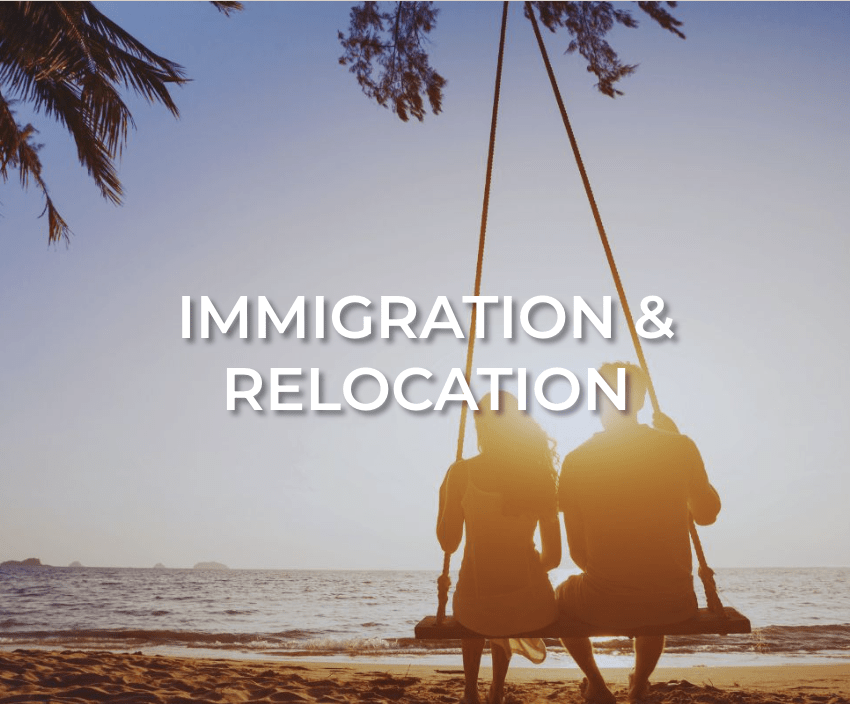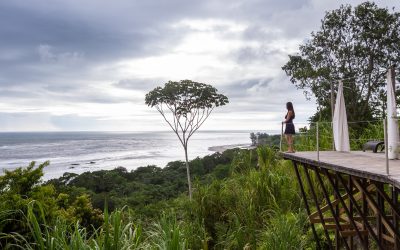

Considering The Regions Of Costa Rica
by Terry Carlile, Howlermag | June. 20, 2024 | Article, Costa Rica Lifestyle
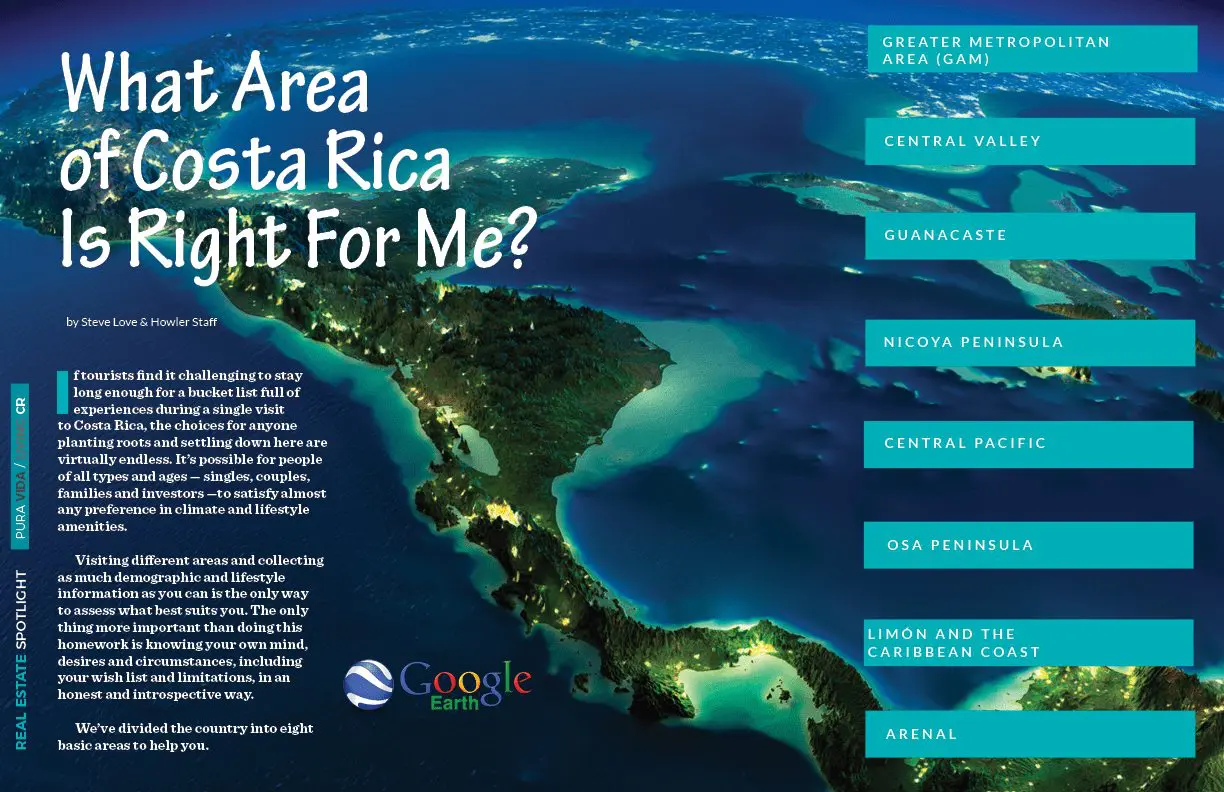
What area of Costa Rica is right for ME?
Based on Google data, Costa Rica ranks in the top five locations searched online by people from Canada, the United States and France looking to buy a second home. From the vibes of a bustling metropolitan city or laid-back neighboring suburb to the idyllic stretches of beach with tourism infrastructure or remote off-the-beaten-path hideaways, there is something for everyone. The variety of property types exists almost everywhere too: from apartments, townhomes and single-family detached houses to building lots and farmland, you’ll find plenty available for purchase or rent, to live in or to derive investment income.
If tourists find it challenging to stay long enough for a bucket list full of experiences during a single visit, the choices for anyone planting roots and settling down here are virtually endless. It’s possible for people of all types and ages — singles, couples, families and investors — to satisfy almost any preference in climate and lifestyle amenities.
The choices for anyone planting roots and settling down here are virtually endless.
Of course, visiting different geographic areas and collecting as much demographic and lifestyle information as you can is the only way to assess what best suits you. The only thing more important than doing this homework is knowing your own mind, desires and circumstances, including your wish list and limitations, in an honest and introspective way. We’ve divided the country into seven basic areas (see the map opposite page) to help you with this process. Please keep in mind this is a high-level general overview of the main spots of the country that most foreigners are moving to.
GAM (Great Metropolitan Area)
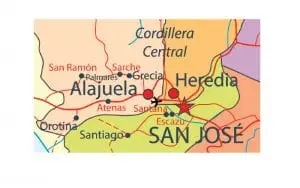
This expansive area includes the capital city of San José and covers varying locations throughout the Central Valley and Upper Central Valley. This area offers spectacular mountain landscapes — from volcanoes to the northeast and central cordillera to the southwest — and sweeping views of the urban metropolis. Short drives can bring you as close to nature in a getaway from city life as your heart desires. Beaches and an endless selection of rainforest adventures are in close proximity — many just an hour or two away, depending on traffic conditions and/or holiday popularity. Notably, the climate here is much cooler than in Costa Rica’s coastal areas.
Options for shopping and access to health care professionals and facilities are plentiful in the GAM, particularly in San José and communities on the outskirts. In addition, dining and entertainment options abound, along with cultural attractions that include a varied range of museums, art galleries, theaters and concert venues. Availability in the GAM of high-quality education at all grade levels, in public and private schools, is excellent.
The Central Valley harbors Costa Rica’s major cities of San José, Escazu, Santa Ana, Heredia and Alajuela. More than three million people live in the Central Valley, accounting for at least 50 percent of the country’s total population. The location of Juan Santamaría International Airport in Alajuela is a convenience factor.
Along the western corridor of highway approaching San José are a cluster of Upper Central Valley towns that include Grecia, Atenas, San Ramón, Palmares and Sarche. These communities offer excellent access to goods, services and infrastructure, and a spring like climate year-round. You’ll find everything from industrial activity and agriculture to tourism and manufacturing. Sarche is known for its unique furniture and the colorful wagons. Places like Palmares are becoming more popular because of the easy living and cool weather, as well as stunning volcano views.
North Pacific Guanacaste
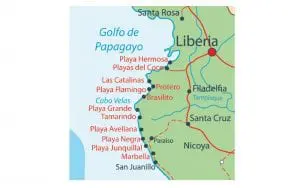
The North Pacific region of Guanacaste, also known as the Gold Coast, encompasses the popular destinations of Playas del Coco in the north and Tamarindo in the south, extending in each respective direction to Golfo Papagayo and Marbella Beach.
Most Guanacaste locations are within a 90-minute drive from the Daniel Oduber Quirós International Airport in Liberia. The airport is a hub for direct and connecting flights to/from hundreds of destinations throughout the Americas and overseas.
Guanacaste is known for its dry tropical forest and a rainy season that is by far the driest in the country. For the other six months of the year, “dry season” is characterized literally by the absence of rain 100 percent of the time. This climate lends itself to virtually all kinds of outdoor activities, be it in the coastal waters or inland adventures.
Not surprisingly, a growing number of expats from all over the world have chosen to call Costa Rica’s Guanacaste area home. Developers have created many beautiful communities with profitable results in marketing to adventurous, outdoor-loving expats seeking to relocate.
Families with children in Guanacaste have access to a wide selection of high-quality schools with internationally recognized accreditations. In fact, outside the GAM, this region offers the highest number of private and public school options in the country. The cultural exposure children gain from multilingual programs, in addition to academic excellence, is an oft-cited advantage of living in this area.
With large marinas being proven economic drivers for the areas surrounding their location, the imminent completion of a world-class marina in Playa Flamingo will put Costa Rica’s Gold Coast solidly on the map. That includes the nearby beach communities of Brasilito and Potrero.
Nicoya Peninsula
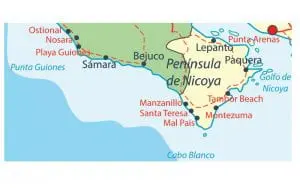
Communities in the Nicoya Peninsula (central and south Pacific coast) are relatively remote from Costa Rica’s main airports — two or more hours away — but have nonetheless attracted a core group of expats seeking to live and invest in a less populated beach area.
Nicoya is renowned for being one of the world’s so-called ‘Blue Zones” where healthy lifestyles enable many people to live past the age of 100 years. For an expat choosing this place to settle, maybe it will add a few years onto your life!
Access to schools, as well as shopping, dining, entertainment and other urban amenities, is somewhat more limited than in the GAM and Guanacaste areas. To get a better sense of the Nicoya region’s off-the-beaten-path appeal, see the article “Nosara: Our Little Secret,” on page 18.
Central Pacific
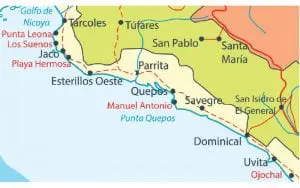
Costa Rica’s Central Pacific region offers relatively close access from the Central Valley to beaches and other natural attractions. This proximity has contributed to its popularity as a place where many expats have chosen to live happily and invest wisely. There’s something for everyone here: nature at its most captivating, along with surfing, fishing, dining and a vibrant nightlife all in one place.
In many respects totally different from Guanacaste, the Central Pacific coast was among the first to be developed in Costa Rica back in the 1980s and early 1990s. In addition to the growing number of expats deciding to live and invest along the Central Pacific stretch of coastline over the last 20 years, many local city-dwelling Costa Ricans have built or purchased weekend homes in places like Punta Leona, Los Sueños and other gated communities in the area. An economic boost has come from the Los Suenos Marina, a world-class facility that has attracted a large number of foreign owned sport fishing boats to call this port home.
That includes the country’s largest and busiest beach town, Jacó. Having grown significantly over the years, Jacó offers a wide variety of restaurants, shopping, entertainment, accommodations and tourist attractions.
Manuel Antonio and Quepos are communities that rival Jacó in popularity, but cater to a somewhat different clientele. Generally speaking, lodging is a little more expensive. Manuel Antonio National Park, globally famous for its combined beachside and rainforest allure, is a major tourism draw. The very well-appointed Quepos Marina has recently increased activity in the area.
Dominical, Uvita and Ojochal are all very small towns with relatively few amenities. An expat lifestyle here involves more planning ahead. Nonetheless, there is no shortage of expats calling this area home and loving their lifestyle there.
By contrast, San Isidro de General is a thriving large town nestled in a mountain valley, just a half-hour drive inland from Dominical. Paved road access through the surrounding hills makes the trip as scenic as it is convenient.
Osa Peninsula
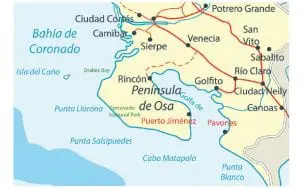
The Osa Peninsula is famous for being one of the most biodiverse concentrations of land area on the planet. Aside from the area’s remoteness, the heavy rains that generally persist four months of the year are a deterrent to many, but by no means all, foreigners. In fact, the Osa has a long-established population of expats and Ticos sharing environmentally enthusiastic common ground. People deciding to settle or invest in real estate here do so exactly because of the Osa’s remoteness. It’s considered an ideal hideout — as opposed to a hangout — for those seeking an eco-conscious, off-the-grid lifestyle. Amenities are relatively few and far between, and education options pretty much limited to public schools or home-schooling.
Osa now boasts a boutique Hilton eco-lodge resort, Botánika Osa, near the Golfo Dulce tropical fjord where migrating humpback whales can be seen seasonally. A new marina is being built at Puerto Jiménez, which is the largest (but still small) town on the peninsula.
Limón and Caribbean Coast
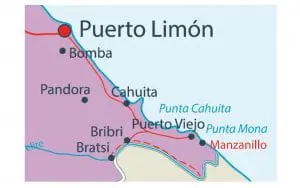
Limón and the Caribbean coast is an exciting place to be right now with a promising future. Historically important as Costa Rica’s major industrial shipping port, but in a region beset by economic hardship over the years, Limón is poised for a rising tide of commercial growth with wide-reaching ripple effects. No business sector has been untouched by the recent opening of Limón’s new state-of-the-art shipping mega-port facility.
Notwithstanding the infusion of investment dollars this mega-project has generated, Costa Rica’s Caribbean coast has never been without its own special charm. While not widely settled by expats, the area has been enjoying increased popularity as a tourist and cruise ship destination. The Jamaican influence on Costa Rica’s distinctive Caribbean culture is apparent in celebrations of indigenous traditions through music and dance, as well as, the use of more spices and coconut milk in local food dishes.
To the north up from Limón province through the Caribbean coast lies the inland waterways to Nicaragua with eco-tourism and fishing lodges. To the south, the small tourist towns of Cahuita, Puerto Viejo and Manzanillo lead to the Panama border. Surfing along the Caribbean coast is good at certain times of the year, and there are excellent conditions for fishing and diving.
Arenal
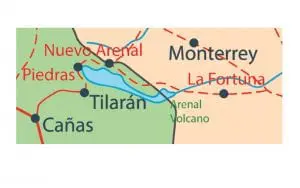
The Arenal region never ceases to amaze when it comes to breathtaking landscapes and thrill-seeking adventures. Arenal has a tourist-driven economy, especially the La Fortuna area’s abundance of adventure tour companies, restaurants, bars, resorts and shopping spots. The Lake Arenal vicinity has a larger expat population than does the tourist town of La Fortuna. The lake itself gives you a sense of Lake Tahoe, but with palm trees and the towering Arenal Volcano at one end. Lake Arenal is a manmade lake, created not only for water consumption but also as a hydroelectric power resource. Nuevo Arenal in the mid-section has a strong expat population, and at the west end is Tilarán, where many appreciate the coolness of a higher elevation, along with magnificent views.
The small towns surrounding Lake Arenal have proven very appealing for expat groups seeking a culture-infused lifestyle as well as nature, and a cooler climate than the beaches offer. The area is also known for being very windy five months of the year, when one end of the lake is a mecca for windsurfers and kite surfers.
Outside the scope of this overview, we must point out that many foreigners are opting to settle or otherwise own real estate in lesser-known micro-areas such as the mountainous Guapilies region. Some likely future hot-spots are emerging in the ripples of newfound popularity while others may be destined to remain well-kept secrets.
When it comes to the comforts and conveniences of everyday life, as well as interesting and charming attributes that make Costa Rica so attractive, the choices are limited only by your imagination. It all depends what pura vida looks like in your own mind’s eye. Take a good look all around the country and you are sure to find what you are looking for.
Disclaimer: The information provided in this blog post is for general informational purposes only and is not intended to constitute legal advice. While we strive to ensure the accuracy and timeliness of the content, laws and regulations are subject to change. For the most accurate and up-to-date information, please contact our office directly. Some images may be AI generated.
Get To Know Quatro Legal

We’re bringing empathy and excellence back to legal counseling. Quatro Legal is built on a bedrock of kindness, a passion for service, and a commitment to guiding you through your legal challenges with ease.
OUR SERVICES
EXPLORE BY
category
REAL
ESTATE
CORPORATE
COSTA RICA
LIFESTYLE
LABOR & EMPLOYMENT
CLIENT
TESTIMONIALS
FREE TRADE
REGIME
All Rights Reserved 2023 | Privacy

